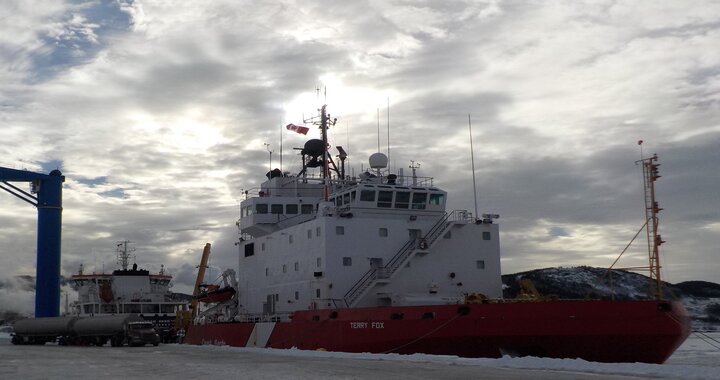The Canadian Coast Guard’s (CCG)
The Canadian Coast Guard’s (CCG) annual Arctic operational season is underway. In total, seven CCG icebreakers are scheduled to deploy from June into November to support northern communities and operational and program commitments.
June 19 – CCGS Terry Fox departed St. John’s, NL, for icebreaking and aids to navigation in the Iqaluit area navigational corridor.
June 25 – CCGS Pierre Radisson departed Quebec City, QC, for icebreaking, aids to navigation, maintenance, and refueling Killiniq station, and Bedford Institute of Oceanography (BIO) science mission.
June 29 – CCGS Des Groseilliers departs Québec City, QC, for icebreaking, refueling the remote Eureka station, and Canadian Hydrographic Service (CHS) surveys.
July 6 – CCGS Sir Wilfrid Laurier departs Victoria, BC, for icebreaking, aids to navigation, CHS surveys, and science programming.
July 14 – CCGS Henry Larsen departs St. John’s, NL, for icebreaking, CHS surveys, and Operation Pacer Goose, the annual resupply of US Air Force Base in Thule, Greenland.
August 18 – CCGS Louis S. St-Laurent departs St. John’s, NL, for icebreaking, CHS surveys and Joint Ocean Ice Study international science mission in the Beaufort Sea.
September 9 – CCGS Amundsen departs Quebec City, QC, for icebreaking and science missions led by Amundsen Science

CCG ships and their dedicated crews are ready to assist the shipping industry during the annual Arctic resupply missions. Safe and efficient navigation in Arctic waters is maintained throughout the shipping season by providing daily updates on ice conditions and operations, as well as ice escorts, when needed, to industry and partners.
Throughout the season, a number of federal government and academic researchers, plus hydrographers, will join CCG ships to carry out new or ongoing scientific projects and hydrographic surveys. CCG will also carry out joint training operations with national and international Arctic partners.
As schedules and opportunities permit, crews will engage in training and equipment familiarization with Canadian Coast Guard Auxiliaries, such as search and rescue and/or environmental response activities. Such opportunities allow crews and communities to build relationships and exchange maritime knowledge with each other.
The CCG continues to actively monitor the COVID-19 pandemic. Although many restrictions have been lifted, the CCG will keep additional protection measures in place and is prepared to adapt its operations when and if necessary.
The Government of Canada is committed to maritime safety, providing essential services to mariners, and ensuring the health and safety of all Canadians. The Canadian Coast Guard’s annual Arctic icebreaking season allows the safe and efficient movement of vessels and goods in northern waters, which is key to community resupply. CCG’s presence in Canada’s North also provides key services, such as search and rescue, support for scientific research, marine communications and traffic services, aids to navigation, and marine environmental response.
Keyword : 10 best BOATING trips, Alberta BOATING, Arctic icebreaking season, Arctic operational season, BC BOATING, boating ontario, Canadian Coast Guard Auxiliaries, Canadian waters, Canadian waters news, CCG icebreakers, CCG ships and their dedicated crews, COVID-19 pandemic, Docks, Expert tips for BOATING trips, go boating, how to drive a boat, how to plan a BOATING trip, how to tow a boat trailer, how to use a BOAT, operational and program commitments, plan a BOATING trip, power boating, waterfront travel, where to boat, where to go boating 10 best BOATING trips, Alberta BOATING, Arctic icebreaking season, Arctic operational season, BC BOATING, boating ontario, Canadian Coast Guard Auxiliaries, Canadian waters, Canadian waters news, CCG icebreakers, CCG ships and their dedicated crews, COVID-19 pandemic, Docks, Expert tips for BOATING trips, go boating, how to drive a boat, how to plan a BOATING trip, how to tow a boat trailer, how to use a BOAT, operational and program commitments, plan a BOATING trip, power boating, waterfront travel, where to boat, where to go boating
